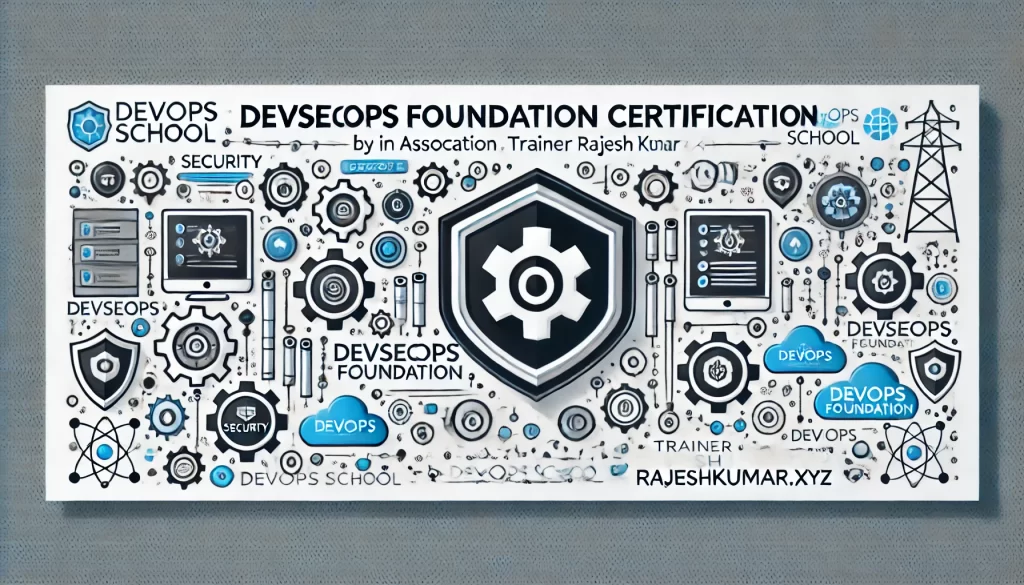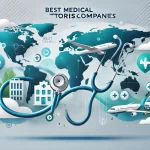
As cybersecurity threats become more advanced, integrating security into the software development lifecycle has become essential. This integration is the core principle of DevSecOps, where security practices are embedded at every stage of development, ensuring more secure and reliable software releases. DevOpsSchool, in collaboration with expert trainer Rajesh Kumar from RajeshKumar.xyz, has introduced the DevSecOps Foundation Certification to help professionals and students master this essential approach. This post will cover the detailed agenda and topics covered in the certification, equipping you with the knowledge and skills to thrive in the field of DevSecOps.
1. What is DevSecOps?
- Definition: DevSecOps is a set of practices that integrate security into every aspect of the DevOps lifecycle, ensuring that software development is secure from the start.
- Importance of DevSecOps: As more companies adopt cloud-native architectures and continuous delivery pipelines, ensuring security at every stage becomes critical to prevent breaches and data leaks.
- Evolution of DevOps to DevSecOps: Traditional DevOps focuses on collaboration between development and operations. DevSecOps brings security into the mix, ensuring that security is not an afterthought but a core component of the process.
2. Overview of DevSecOps Foundation Certification
- Certifying Body: The DevSecOps Foundation Certification is offered by DevOpsSchool in collaboration with industry expert Rajesh Kumar.
- Target Audience: This certification is designed for IT professionals, security specialists, developers, DevOps engineers, and system administrators who want to integrate security practices into their DevOps approach.
- Prerequisites: Basic knowledge of DevOps principles and security practices is recommended, but the course is designed to accommodate professionals at all levels.
3. Why Pursue DevSecOps Foundation Certification?
- Growing Demand for DevSecOps Skills: With increasing cyber threats and compliance requirements, organizations are actively seeking professionals who understand how to integrate security into DevOps workflows.
- Hands-on Skills: This certification equips you with practical skills to implement security controls, automate security processes, and secure cloud environments.
- Career Advancement: Certified DevSecOps professionals are in high demand, as more companies look to secure their development pipelines and infrastructure.
Certification Agenda and Key Topics
The DevSecOps Foundation Certification offers an extensive curriculum designed to provide you with a strong foundation in securing DevOps environments. Below is the comprehensive agenda covered in the certification course:
A. Introduction to DevSecOps
- What is DevSecOps?: Understanding how DevSecOps differs from traditional DevOps and its role in improving software security.
- The Shift Left Approach: How DevSecOps integrates security earlier in the development lifecycle to detect and address vulnerabilities before deployment.
- DevSecOps Culture: Building a culture of shared responsibility for security across development, operations, and security teams.
B. Key DevSecOps Practices
- Security as Code: How to treat security policies and practices as code, allowing for versioning, automation, and consistency.
- CI/CD Pipeline Security: Securing Continuous Integration and Continuous Delivery pipelines to ensure that security checks are integrated throughout the software delivery process.
- Automation of Security: Leveraging tools to automate security checks, vulnerability scanning, and compliance validation during development and deployment.
C. DevSecOps Tools and Technologies
- Security Scanning Tools: Learn how to use tools like SonarQube, OWASP ZAP, and Snyk to scan code for vulnerabilities.
- Container Security: How to secure containers and containerized applications using tools like Docker Security, Clair, and Falco.
- Cloud Security: Best practices for securing cloud environments in AWS, Azure, and Google Cloud, with tools like AWS Shield, Azure Security Center, and Google Cloud Security Command Center.
D. Threat Modeling and Risk Management
- Threat Modeling Techniques: Learn how to identify potential threats and vulnerabilities in your applications and infrastructure.
- Risk Management: How to assess and mitigate security risks throughout the DevOps lifecycle.
- Implementing Security Controls: Best practices for putting in place security controls to protect against common threats, such as DDoS attacks, SQL injection, and cross-site scripting.
E. Compliance and Governance in DevSecOps
- Regulatory Compliance: Understanding how to integrate compliance requirements (such as GDPR, HIPAA, and PCI DSS) into your DevOps pipeline.
- Security Governance: Establishing governance policies that ensure your organization adheres to security best practices while maintaining agility.
- Auditability and Reporting: Automating the collection of audit logs and reports to ensure continuous compliance with industry standards.
F. Vulnerability Management
- Identifying Vulnerabilities: Learn how to identify vulnerabilities in your software and infrastructure using scanning tools and manual assessments.
- Patch Management: Best practices for keeping systems up to date with the latest security patches.
- Incident Response: Establishing effective incident response plans to quickly identify, contain, and remediate security incidents.
G. Monitoring, Logging, and Auditing for Security
- Security Monitoring Tools: An overview of tools like Prometheus, Grafana, and ELK Stack for monitoring system security in real-time.
- Log Management: How to collect, store, and analyze logs for security insights and to detect potential threats.
- Auditing Tools: Using tools like Splunk and Datadog for continuous security auditing and alerting on suspicious activities.
H. Collaboration Between Development, Security, and Operations Teams
- Building Cross-Functional Teams: How to create teams that work together to ensure security is integrated into every stage of the development process.
- Blameless Postmortems: Encouraging a culture of learning from security incidents without blame and improving processes to prevent future occurrences.
- Security Champions: Empowering individuals in development and operations teams to become security advocates, helping to identify and resolve security issues.
5. Exam Preparation Tips
- Master the Core Concepts: Ensure you have a deep understanding of core DevSecOps principles, including security automation, vulnerability management, and secure CI/CD pipelines.
- Hands-on Practice: Work with DevSecOps tools like SonarQube, Jenkins, Docker, and AWS to reinforce the theoretical knowledge with practical experience.
- Attend Live Sessions: Participate in live training sessions with Rajesh Kumar to gain insights into real-world applications of DevSecOps practices.
- Join Security Communities: Engage in discussions with DevSecOps and security professionals in online communities to learn from their experiences and challenges.
6. Certification Exam Details
- Format: The DevSecOps Foundation Certification exam is a multiple-choice online test.
- Duration: The exam typically lasts 60 to 90 minutes.
- Passing Criteria: A minimum score of 70% is required to pass the exam and obtain the certification.
- Recertification: Given the rapidly evolving nature of cybersecurity, recertification is recommended every two years to stay updated on the latest trends and tools in DevSecOps.
7. Conclusion: Why Choose DevSecOps Foundation Certification?
The DevSecOps Foundation Certification by DevOpsSchool, led by Rajesh Kumar, provides an essential grounding in the integration of security into DevOps practices. As cyber threats continue to evolve, this certification ensures that you are prepared to build secure, reliable, and compliant software systems. Whether you are an IT professional, developer, or security expert, this certification equips you with the skills and tools to secure software delivery pipelines and infrastructure.






Leave a Reply
You must be logged in to post a comment.